
- Home
- India
- World
- Premium
- THE FEDERAL SPECIAL
- Analysis
- States
- Perspective
- Videos
- Sports
- Education
- Entertainment
- Elections
- Features
- Health
- Business
- Series
- In memoriam: Sheikh Mujibur Rahman
- Bishnoi's Men
- NEET TANGLE
- Economy Series
- Earth Day
- Kashmir’s Frozen Turbulence
- India@75
- The legend of Ramjanmabhoomi
- Liberalisation@30
- How to tame a dragon
- Celebrating biodiversity
- Farm Matters
- 50 days of solitude
- Bringing Migrants Home
- Budget 2020
- Jharkhand Votes
- The Federal Investigates
- The Federal Impact
- Vanishing Sand
- Gandhi @ 150
- Andhra Today
- Field report
- Operation Gulmarg
- Pandemic @1 Mn in India
- The Federal Year-End
- The Zero Year
- Science
- Brand studio
- Newsletter
- Elections 2024
- Events
- Home
- IndiaIndia
- World
- Analysis
- StatesStates
- PerspectivePerspective
- VideosVideos
- Sports
- Education
- Entertainment
- ElectionsElections
- Features
- Health
- BusinessBusiness
- Premium
- Loading...
Premium - Events
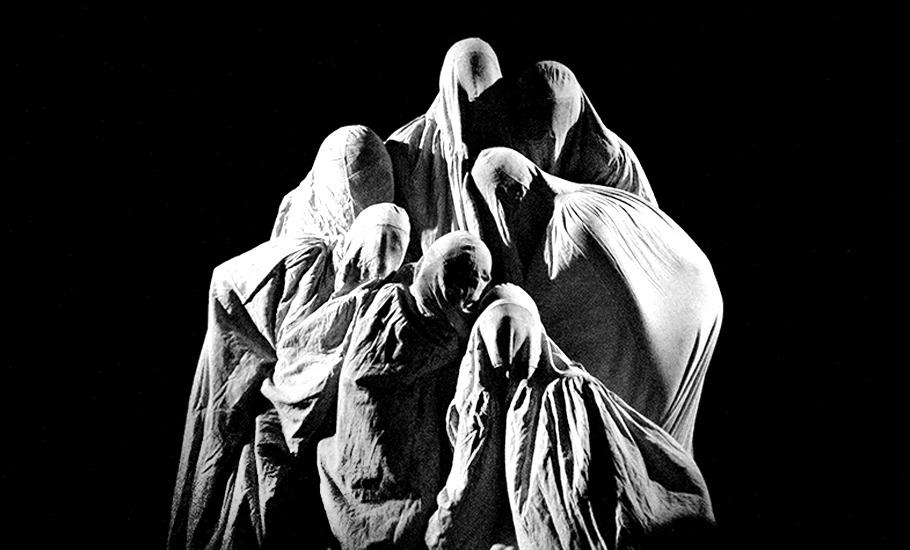
Tamil Nadu theatre group marks 25 years of transcending the limits of body

Based in Kovilpatti in Tamil Nadu’s Tuticorin district, Manalmagudi is famous for its ritual theatre. While lack of support and sponsorship has proven to be stumbling block for the growth of contemporary Tamil theatre, the Kovilpatti-based theatre troupe has scripted a unique story of success spanning 25 years by exploring the potential of the body to tell stories. Launched in 1997,...
Based in Kovilpatti in Tamil Nadu’s Tuticorin district, Manalmagudi is famous for its ritual theatre. While lack of support and sponsorship has proven to be stumbling block for the growth of contemporary Tamil theatre, the Kovilpatti-based theatre troupe has scripted a unique story of success spanning 25 years by exploring the potential of the body to tell stories.
Launched in 1997, the Manalmagudi Theatre Land is marking its silver jubilee with continuous theatrical experiments this year. What makes Manalmagudi (rhythm of land) different is that it is an experimental theatre troupe which focuses on traditional rituals when it comes to performance. The idea is to explore and transcend the limits of body, space and time.
S Murugaboopathy, founder of Manalmagudi, uses land and rituals from rural contexts and transforms them into a new genre of theatre. He makes the human body move beyond the conventional frame of theatre. The body creates a language of its own and communicates with the audience, according to Murugaboopathy, who is planning a four-day festival to mark 25 years of Manalmagudi Theatre Land in May 2023.

Manalmagudi doesn’t believe in conventional human centric theatre practices. The challenge lies in incorporating theatrical language of non-human forms such as animals, plants, dolls, masks, sculptures and paintings within the productions. The land or space for rehearsals and performances range from natural landscapes like forests, sand dunes, rocky terrains to prosceniums in towns and cities. Manalmagudi has performed its plays at various venues across Tamil Nadu since the troupe was launched in 1997.
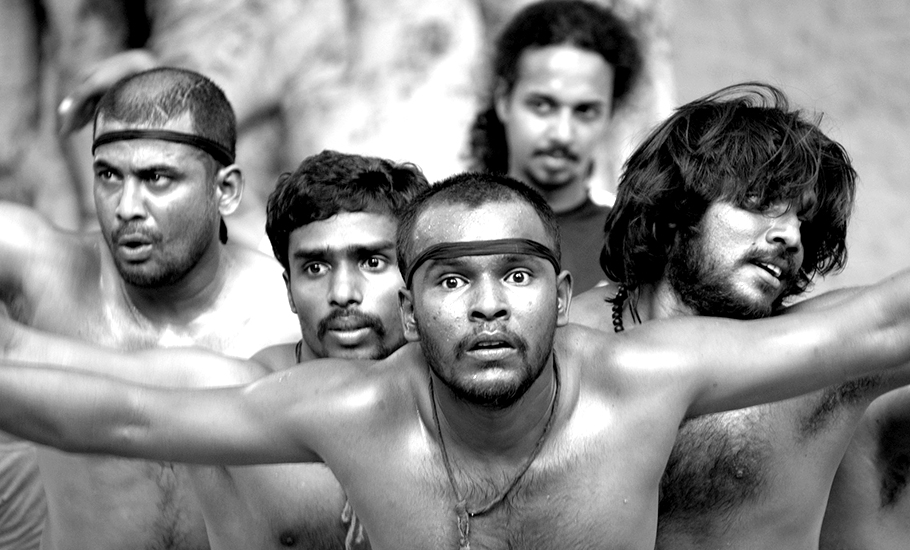
The troupe has also performed plays across India, including many international and national theatre festivals. The main plays that Murugaboopathy directed are Vanathadhi, Koondhal Nagaram, Uthiramugamoodi, Semmoodaay, Kathaivanam, Kuttrum Pattriya Udazh, Miruga Vidhushagam, Soorpanangu, Kugaimaravasikal and Neer Nadodikal. While Kugaimaravasikal (cave tree dwellers) tells the story of a group of forest dwellers who are chased away from their cave because their mountains have minerals, Neer Nadodikal (nomads of water) deals with the deluge that wreaked havoc in Chennai in 2015. Soorpanangu is based on the issues that women face.
“Murugabhoopathy’s plays undergird the human body as a dynamic space to frame the trajectory of history from ancient rituals to contemporary culture, and foreground the movement of the actors and the various objects of the ritual, like the lamp, sieve, basket, mortar and pestle, to paint the many shades of oppression experienced by women, clowns, animals, landless farmers, refugees, workers, employees and children,” writes Swarnavel Eswaran Pillai of Michigan State University in his research paper titled Miruga Vidusagam: Theatre of the Body, Ritual and Land, published in Studies in South Asian Film & Media.
Murugaboopathy is the grandson of veteran playwright and freedom fighter Maduraikavi Bhaskaradoss and son of MS Shanmugam, a senior Tamil novelist. He does many roles. He is an actor, director, playwright and music composer for the troupe. He was awarded Ustad Bismillah Khan Yuva Puraskar, by Sangeet Natak Akademi, New Delhi in 2011.
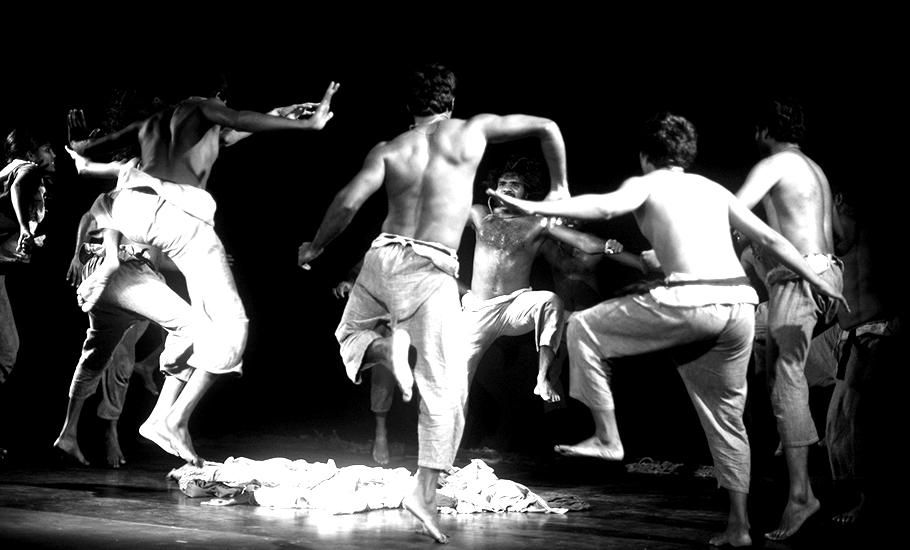
Murugaboopathy’s constant search with his troupe led him to subaltern rituals, performances, movements, voices, music and spaces, and to themes affecting contemporary lives and cultures of communities, especially of the marginalised, displaced and nomadic. “He (Murugaboopathy) feels that the drama texts need not only actors but also ‘land’. Then he looks for ‘land’ suitable for his ‘text’. The search takes the form of an evolving non-human centred body and land based theatre ritual in Manalmagudi performances,” said Boopalan, organiser and a prominent member of the troupe.
It was his close association with some members in a circus troupe as a child that led Murugaboopathy to theatre eventually. “They [members in the circus troupe] stayed at a rented house near my house. I was studying in Class 7. They were from various parts of India. They spoke Telugu, Hindi, Malayalam and Assamese. I heard stories from them. I found the circus as a tent full of refugees. The body in the circus has never been static. It moved from one place to the other. There was constant cancelling of the self in this movement. It was this idea which I later utilised in transforming the power of the body in theatre,” said Murugaboopathy.
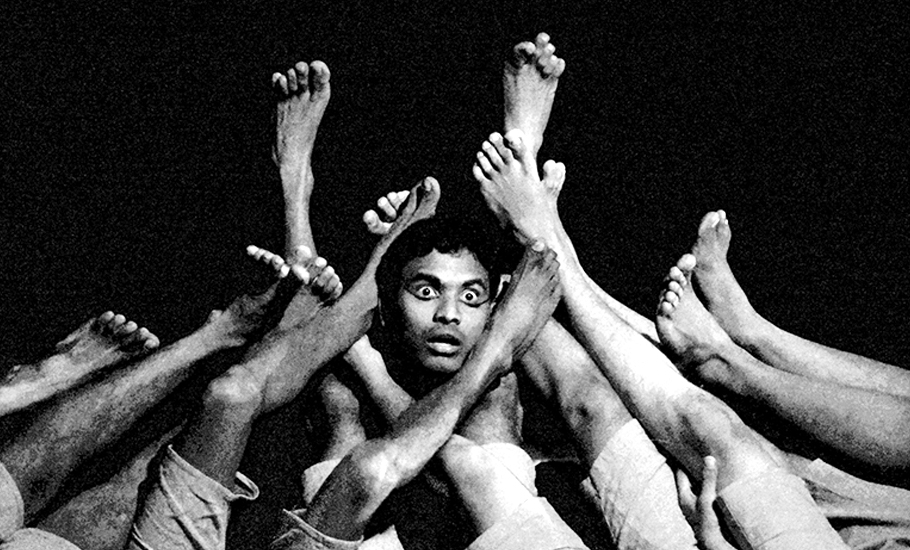
The Manalmagudi Theatre Land today has 24 artists of which 15 are full-time members. Rituals play a major role in the plays of Murugaboopathy as he believes that only in rituals, the complete freedom of the body germinates and rejuvenates. “Rituals are the conscience of a society. Examples from rock arts, cave paintings and stone inscriptions across the country repeatedly convey this kind of distinct (cultural) world in which rituals are performed in favour of agriculture and agriculture stands in favour of rituals. I use rituals that are followed in remote villages of Tamil Nadu to explain the silences and gaps in mainstream history. The rituals are introduced in a new set of forms to expose the contemporary issues in society,” he said.
Murugaboopathy has directed more than 54 plays of which 26 are children’s plays. For him, each play is an experiment in itself. “Murugabhoopathi’s plays reject the stage practices of proscenium theatre. In proscenium theatre, the actors can speak directly in a straightforward manner to the ‘audiences’. Thus the actors in an elevated stage can dominate audiences by establishing themselves as powerful. Bhoopathi refers this association of power with the bodies [actors] is due to colonisation and its proscenium theatre,” writes S Karmegam, in his research paper titled Ritual, Body and Land: Kuntal Nagaram and other plays of Murugaboopathy.
For Murugaboopathy, the basic function of the language is linking the human body with land, transforming the single, organic body into a social human body, according to Karmegam. “When he rereads the ancient Tamil grammar text, Tolkappiyam, he works basically with language. But at the same time, he weaves his arguments logically on how language reacts with the body, how it becomes a ‘catalyst’ for transforming the body in relation to the land. Here in the plays of Murugaboopathy, the catalyst, language, also transforms itself in relation to body and land,” he added.
The four-day festival, to be held from May 5 to 9 in 2023, is also an exercise to check the contributions of Manalmagudi to Tamil theatre since it was launched in 1997. “We will be inviting eight prominent theatre troupes from various parts of India to Kovilpatti to stage their plays. There will be discussions and talks on the current trends in theatre,” said Murugaboopathy. Twenty-five years of continuous performance is a great achievement for a theatre troupe, but it was challenging.
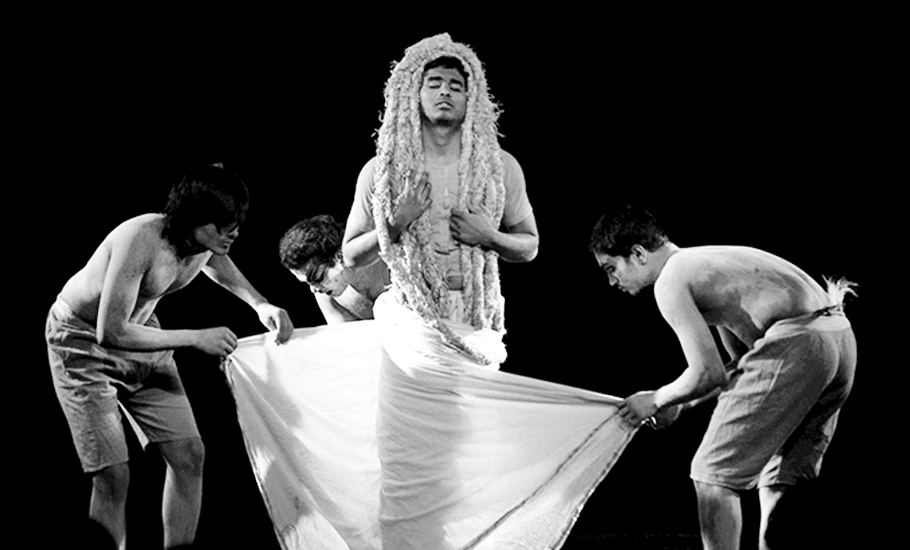
“We haven’t accepted funds from any government or private institutions so far. We will never make such compromises. But at the same time, survival is not easy. Finding good artists is difficult these days. Many artists in the troupe are there because they are passionate about theatre. We could complete for 25 years mainly because of their devotion and hard-work,” he added.
